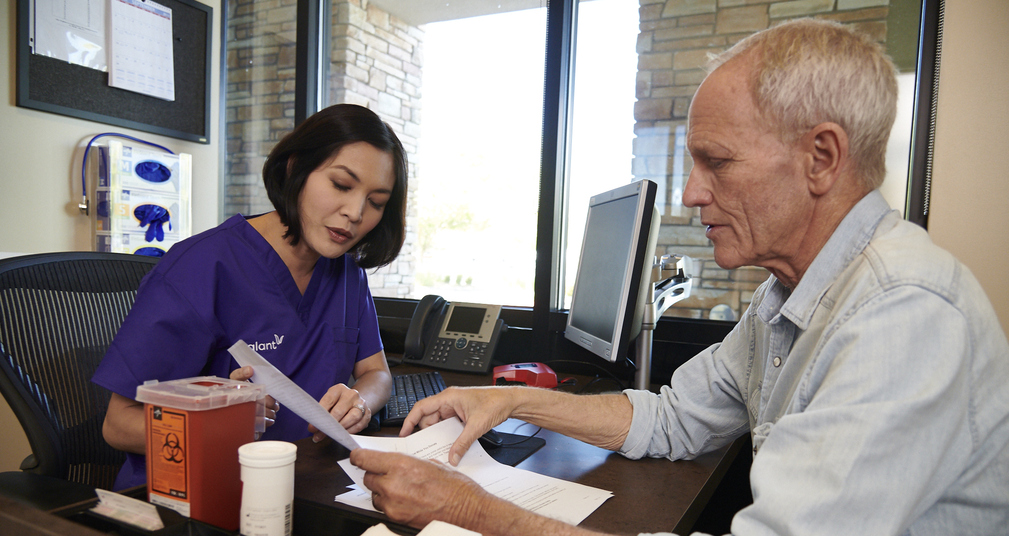If you’ve never donated blood before, you may have a lot of questions or concerns about being able to donate. Even if you’ve donated before but not done so in a while, or maybe got a piercing or tattoo recently, you probably have blood donation eligibility questions. We have the answers.
The biggest question for first-time donors is usually CAN I donate blood? There are a few basic blood donation requirements: a minimum age and weight requirement, plus being in general good health. Read all our eligibility requirements.
The reality is the majority of U.S. residents can donate blood — but few do! That’s why we always need donors.
Below, we answer frequently asked questions and address blood donation requirements beyond basic eligibility. In each case, you must also meet basic blood donation requirements and pass our mini-physical on the day of donation.
How old do you have to be to donate blood?
In the U.S., those as young as 16 can donate blood with parental permission. Many donors begin their lifesaving journeys at high school blood drives. There are additional height and weight requirements for donors aged 16-22 that can be found on our eligibility page. There is no upper age limit to donate. As long as you are in good health, you can donate when you’re in your 90s and beyond!
Can you donate blood if you have tattoos or piercings?
YES! It’s a common misconception that tattoos disqualify you from donating. We have lots of donors with multiple tattoos who donate regularly. If your tattoos/permanent makeup/micro-blading was done in a state-regulated shop, with sterile needles and single-use ink, you’re fine to donate blood.
Only Washington, D.C., and a handful of states (Connecticut, Georgia, Idaho, Maryland, Massachusetts, New Hampshire, New York, Pennsylvania, Utah and Wyoming) don’t regulate these businesses. But even if you get your procedure in one of these places, you only have to wait three months before you can donate.
How often can you donate blood?
This one’s a little trickier because it depends on what type of donation you make. Generally speaking, you can donate whole blood every 56 days, platelets every 7 days, Power Red every 112 days and plasma every 28 days. There are some volume restrictions as well, to ensure donor safety. So, depending on your height, weight and how much blood, platelets or plasma you give with each donation, you may have to space out your appointments further. It’s best to check your next eligibility date with your phlebotomist when scheduling your follow-up appointments.
Can you donate blood if you smoke?
Smoking cigarettes and vaping doesn’t disqualify you from donating blood. But both can raise your blood pressure, which could defer you from donating if it’s too high. It’s recommended that blood donors abstain as long as possible from smoking before donating blood for the best possible donation experience.
Smoking cannabis also doesn’t prevent you from donating blood, but blood donors at Vitalant cannot be under the influence of alcohol, cannabis or other drugs during their donation visit.
What if you have a low hemoglobin level?
When you come in to give blood, Vitalant staff will check your hemoglobin level to make sure it’s high enough for you to safely donate. The hemoglobin in red blood cells carries oxygen from your lungs to your heart and provides energy, so we wouldn’t want to remove more of it during a blood donation if your levels are already low.
Hemoglobin is not the same as iron, but iron is an important part of your hemoglobin, so increasing your iron levels can help. Eating certain foods may help, as can iron supplements. It’s best to talk with your healthcare provider about this, especially if you have consistently low iron or hemoglobin levels.
Can you donate blood if you traveled outside of the United States?
Previous donation restrictions for those who spent time in the UK or Europe have been lifted, so no issues with that any longer. Other restrictions have been lifted as well; read more here.
You may be deferred from donating blood if you traveled to an area where malaria is a risk, but the deferral would only be for three months. Because malarial areas can change, we recommend you call us at 800-289-4923 with any questions about your recent travel.

